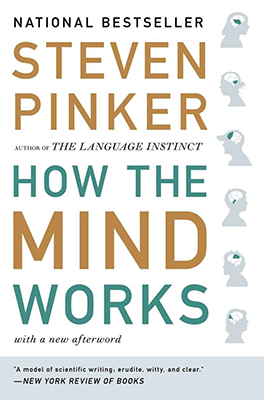How The Mind Works
“How the Mind Works” is a comprehensive exploration of the human mind by Steven Pinker, a cognitive psychologist and linguist. Published in 1997, the book delves into various aspects of cognition, evolution, and psychology to explain how the human mind functions. Here’s a summary of the key themes and concepts covered in the book:
Evolutionary Psychology: Pinker argues that many aspects of human behavior and cognition can be understood through the lens of evolutionary psychology. He examines how natural selection has shaped the human mind over millennia to solve adaptive problems faced by our ancestors.
Modularity of Mind: Pinker posits that the human mind is not a single, general-purpose processor, but rather a collection of specialized cognitive mechanisms or modules. These modules are responsible for different tasks such as language acquisition, spatial reasoning, social interaction, and so on.
Language: A significant portion of the book is dedicated to exploring language and its evolution. Pinker discusses how language is structured, acquired by children, and processed in the brain. He proposes that language is a product of both genetic evolution (instinct) and cultural evolution (learning).
Perception and Vision: Pinker examines how the human brain processes sensory information, particularly vision. He discusses visual illusions, depth perception, and how the brain constructs a coherent representation of the visual world from sensory inputs.
Emotions and Social Behavior: The book explores the evolutionary origins of emotions and their role in social interactions. Pinker discusses topics such as aggression, altruism, empathy, and the ways in which emotions influence decision-making and social bonding.
Artificial Intelligence: Pinker touches upon the field of artificial intelligence and the quest to simulate human-like intelligence. He contrasts human cognition with artificial intelligence, highlighting the differences in approach and capabilities between machines and biological systems.
Critique of Standard Social Science Model: Throughout the book, Pinker challenges the “Standard Social Science Model,” which posits that the mind is a blank slate shaped primarily by culture and learning. Instead, he argues for a view that incorporates both innate biological factors and environmental influences.
Philosophical Implications: Pinker’s exploration of the mind extends into philosophical realms, addressing questions about consciousness, free will, and the nature of human experience.
Overall, “How the Mind Works” synthesizes insights from cognitive science, evolutionary biology, psychology, and linguistics to provide a comprehensive understanding of the human mind. It’s a seminal work that continues to influence discussions about cognition and human nature.

